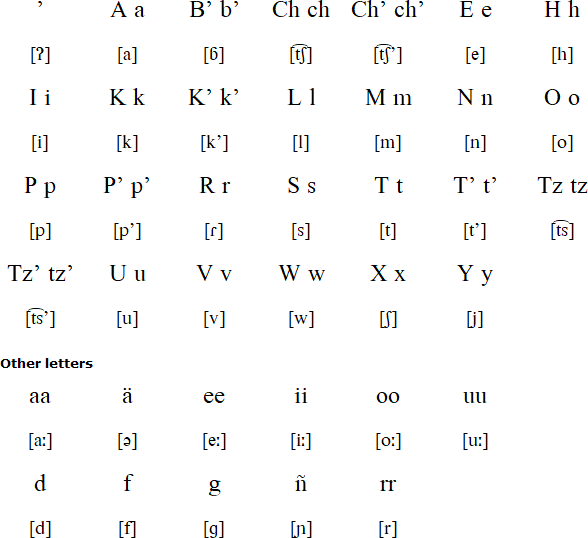Itzaʼ is a Yucatecan Mayan language spoken by the Itza people mainly in the village of San José on the north shore of Lake Petén Itzaʼ in Petén department in northern Guatemala. It also used to be spoken in parts of Belize. In 2019 there were 410 native speakers of Itzaʼ, all of whom were older adults. Younger people have shifted to Spanish.
When the Yucatan Peninsula was governed from Chichen Itza between about 600 AD and 1697, Itzaʼ was the main language of administration in the area, and this was the last independent Maya nation in Mesoamerica.
Speaking Itzaʼ was banned by the government of Guatemala in the 1930s. In the 1980s the Maya people started to become increasingly interested in their culture and languages, and the Academia de Lenguas Mayas de Guatemala (ALMG), or Guatemalan Academy of Mayan Languages, which was set up in 1990 to promote and revitalize Itzaʼ and other Mayan languages.
Itzaʼ is also known as Icaiche Maya, Itz, Itzaj, Itzaj Maya, Itzaʼ Maya, Maya or Petén Itza’ Maya. It is an officially recognized language in Guatemala.
Itzaʼ can be written with the Latin alphabet using an orthography created by the ALMG. There are some publications in the language, including a dictionary, grammar and other texts.

D, F, G, Ñ, R, RR and V are only used in loanwords from Spanish.
Download an alphabet chart for Itzaʼ (Excel)
Information about Itzaʼ
https://en.wikipedia.org/wiki/Itzaʼ_language
https://www.ethnologue.com/language/itz
https://www.unesco.org/archives/multimedia/document-1784
http://www.native-languages.org/itzaj.htm
http://www.famsi.org/spanish/mayawriting/dictionary/boot/itza_based-on_hofling1991.pdf
Achi, Akatek, Awakatek, Chontal Maya, Chʼol, Chorti, Chuj, Huasteco, Itzaʼ, Ixil, Jakaltek, Kaqchikel, Kʼicheʼ, Lacandon, Mam, Mochoʼ, Mopan, Poqomam, Poqomchiʼ, Qʼanjobʼal, Qʼeqchiʼ, Sakapultek, Sipakapense, Tektitek, Tojolabal, Tzeltal, Tzotzil, Tzʼutujiil, Uspantek, Yucatec Maya
Languages written with the Latin alphabet
Page created: 29.11.21. Last modified: 01.12.21
[top]
You can support this site by Buying Me A Coffee, and if you like what you see on this page, you can use the buttons below to share it with people you know.

If you like this site and find it useful, you can support it by making a donation via PayPal or Patreon, or by contributing in other ways. Omniglot is how I make my living.
Note: all links on this site to Amazon.com, Amazon.co.uk
and Amazon.fr
are affiliate links. This means I earn a commission if you click on any of them and buy something. So by clicking on these links you can help to support this site.
[top]